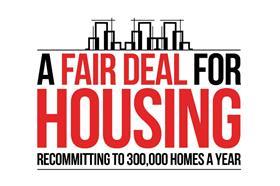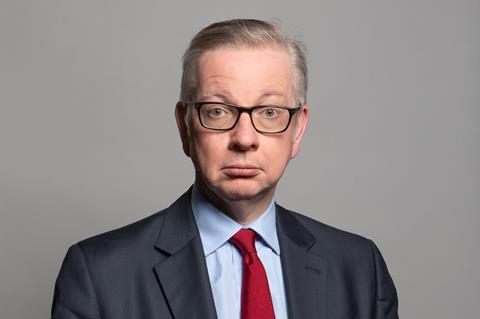Housing secretary hints at reworking of local housing targets and puts Investment Zones policy under review

Michael Gove has confirmed the government still intends to meet its manifesto pledge of building 300,000 homes a year following uncertainty over the target given his predecessor’s pledge to abolish “top down” housing numbers.
The new housing secretary yesterday answered “yes” when asked by BBC journalist Laura Kuenssberg whether the pledge to build 300,000 houses each year in England, made in the 2019 election-winning Conservative manifesto, remained the government’s target. Housing Today, through its A Fair Deal for Housing campaign, has called on the government to re-commit to the target and is working with industry to draw on recommendations to enable it to achieve it.
In addition, Gove, who was last week reappointed to the housing secretary role following Rishi Sunak’s appointment as prime minister, implied he was intending to reform and review the system for forming local housing targets.
Former PM Liz Truss had promised to abolish what she branded “Stalinist” top-down housing targets, albeit neither she nor her ministers were in post long enough to clarify whether that pledge referred to the overall 300,000-home national target, or the “standard method” formula for generating local council housing targets.

In answer to questions about the targets, Gove both committed himself to the overall 300,000 homes-a-year figure, and implied that some form of central formula for calculating local housing numbers would remain, even if in a “rebased” form.
See also: Gove is back - the key policy questions for the returning housing secretary
He said: “The top-down housing targets that […] Liz [Truss] was referring to, are part of a broader and different calculation from the 300,000 in the manifesto.
We’re talking two different things here. But my view is that what we do need is a fair way of allocating housing need that takes account of changes in population. Some of the calculations that have been made in the past have been wrong, we need to rebase that.”
However, he added that development would only be allowed with local consent. He said: “We critically need to make sure that we have local communities consenting to development, and that means that homes need to be more beautiful, it means that we need infrastructure alongside them. But it critically also means that we need to make sure that the environment is protected as well.”
While Gove said the 300,000 figure remained a target, he did not commit to actually meeting it, as he said this was “going to be made more difficult because of the economic circumstances that we face.”
He said: “The cost of materials has increased because of the problems with global supply chains, and also a very tight labour market means that the capacity to build those homes at the rate we want is constrained.”
In addition, Gove said his department will now put the proposals for Investment Zones under “review”, because of the “concerns” sparked by the proposals to reduce environmental regulations. He said: “We’re also reviewing plans, which under Liz Truss were being brought forward, these investment zones, which understandably caused some concern.
“We’ll look at them, we will review them, but there is no way we’re undermining our environmental protections.”
Liz Truss’ government had promised to unleash a wave of development in Investment Zones across the country, which were to benefit from a raft of tax incentives and planning and environmental deregulation.
A Fair Deal for Housing campaign

Housing Today believes the government should not back away from its manifesto pledge of building 300,000 new homes a year by the middle of the decade. We badly need more homes and a lack of supply is a major factor in creating problems of affordability for both buyers and renters.
Over the next few months, Housing Today will be exploring potential solutions to help us ramp up housebuilding to 300,000. These are likely to, include different ways of working, funding asks of government and policy ideas that could boost housebuilding.
We want to hear from you: what do you think can make a difference at a policy level?
What can the industry do better?
We believe that, with the right commitments from ministers and the industry, it is possible to build more homes and help the government to meet its objectives to “build beautiful”, improve quality and safety, boost home ownership and level up the UK.
Click here to find out more about the campaign
To contribute ideas to our A Fair Deal for Housing Ideas Zone database, click here.










No comments yet